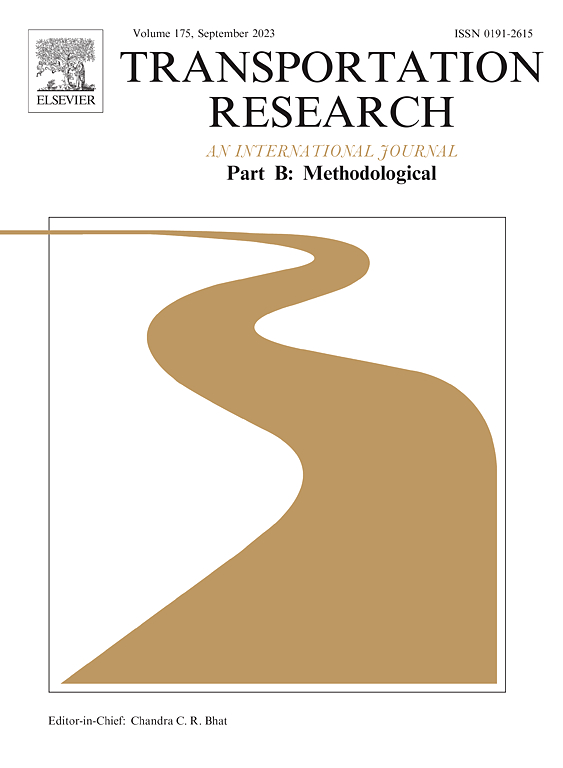外包决策中的多商品流问题
IF 6.3
1区 工程技术
Q1 ECONOMICS
引用次数: 0
摘要
我们引入了一个新的奖品收集问题,该问题涉及由预定义的枢纽和非枢纽节点组成的网络中的商品路由。在这种情况下,将非集线器节点的业务外包给第三方运营商。这项研究的动机是,在现实世界的运输系统中,外包实践越来越普遍,新进入者或当地供应商越来越多地接管了运输链的一部分,从而实现了更高的运量和更广泛的网络覆盖。这个问题被建模为一个Stackelberg博弈:一个大公司(领导者)选择一个商品子集来服务。领导者的目标是将运输服务的第一步和最后一步外包给较小的运营商(追随者),每个非枢纽节点最多分配一个运营商。每个航空公司都寻求自己的利润最大化,这取决于领导者的报价。领导者的目标是确定最优的外包费用,并将运营商分配到非枢纽节点,从而使路由商品的利润最大化。必须考虑追随者的最佳反应,因为追随者可能会拒绝与他们的利润最大化目标不一致的分配。我们还考虑了两种可供选择的设置:一种是固定的外包费用,另一种是运营商接受任何产生非负利润的报价。我们证明了可行外包费用的集合可以离散化,并将问题表述为单级混合整数(非线性)规划。对于所有问题变体,我们证明了np -硬度,并对各种单级MIP重新公式进行了计算研究。我们的基准案例涵盖各种运输应用,例如航空运输、邮政配送和货运。我们评估了建议配方的可扩展性,并分析了不同运营商预订价格对解决方案质量的影响。最后,通过比较不同的问题设置,我们提取了有价值的管理见解。本文章由计算机程序翻译,如有差异,请以英文原文为准。
The multi-commodity flow problem with outsourcing decisions
We introduce a new prize-collecting problem involving the routing of commodities in a network composed of predefined hub and non-hub nodes. In this setting, the service of non-hub nodes is outsourced to third-party carriers. This study is motivated by the growing prevalence of outsourcing practices in real-world transportation systems, where new entrants or local suppliers increasingly take over parts of the transportation chain – enabling higher volumes and broader network coverage. The problem is modeled as a Stackelberg game: a major firm (the leader) chooses a subset of commodities to serve. The leader aims to outsource the first and last legs of the transportation services to smaller carriers (the followers), assigning at most one carrier to each non-hub node. Each carrier seeks to maximize its own profit, which depends on the offers made by the leader. The goal of the leader is to determine the optimal outsourcing fees, along with the allocation of carriers to the non-hub nodes, so that the profit from the routed commodities is maximized. The optimal response of the followers must be taken into account, as the followers may reject assignments that do not align with their profit-maximizing goals. We also consider two alternative settings: one in which outsourcing fees are fixed, and another where carriers accept any offer yielding non-negative profit. We demonstrate that the set of feasible outsourcing fees can be discretized and formulate the problem as single-level mixed-integer (non)linear program. For all problem variants, we prove NP-hardness and conduct a computational study of various single-level MIP reformulations. Our benchmark instances cover various applications in transportation, such as air transportation, postal delivery and freight transportation. We assess the scalability of proposed formulations and analyze the impact of different carrier reservation prices on solution quality. Finally, by comparing the alternative problem settings, we extract valuable managerial insights.
求助全文
通过发布文献求助,成功后即可免费获取论文全文。
去求助
来源期刊
CiteScore
12.40
自引率
8.80%
发文量
143
审稿时长
14.1 weeks
期刊介绍:
Transportation Research: Part B publishes papers on all methodological aspects of the subject, particularly those that require mathematical analysis. The general theme of the journal is the development and solution of problems that are adequately motivated to deal with important aspects of the design and/or analysis of transportation systems. Areas covered include: traffic flow; design and analysis of transportation networks; control and scheduling; optimization; queuing theory; logistics; supply chains; development and application of statistical, econometric and mathematical models to address transportation problems; cost models; pricing and/or investment; traveler or shipper behavior; cost-benefit methodologies.

 求助内容:
求助内容: 应助结果提醒方式:
应助结果提醒方式:


